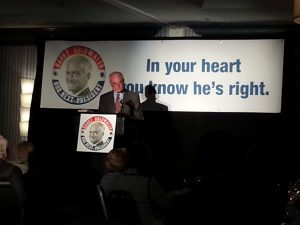“Had I known about Barry Goldwater’s run for the presidency in 1964,” said AHI Resident Fellow Mary Grabar, “I would no doubt have become a ‘Goldwater Girl’—even at the age of seven. For one thing, Goldwater believed in freedom, law and order, and defending ourselves against the Communists. My parents escaped with me as a two-year-old from communist Yugoslavia (the part that is now Slovenia). I knew about communist oppression from stories at the dinner table. In 1964, my Rochester, New York, neighborhood was being wracked by riots and urban decay. Goldwater stood for all the things I wanted in a president, but didn’t yet know.
“I was fortunate, thanks to the financial support of the Alexander Hamilton Institute, to attend the 50th anniversary celebration of the Goldwater campaign in Washington, D.C., on 18 November. The event also raised funds for a statue of Goldwater in the nation’s capitol. At the AHI, I am preparing a book on one of Goldwater’s supporters, the African-American journalist and fiction writer, George S. Schuyler, one of the most conspicuous and controversial African-American journalists of his generation.”
The event included a panel discussion at the Heritage Foundation, followed by a reception and dinner at the Capitol Liaison Hotel, where Goldwater’s sons, Michael and Barry Goldwater, Jr., spoke. “Although Barry, Jr. poignantly noted that this might be the last reunion for many of those there that night,” Grabar observed, “I was struck by how much the 1964 Goldwater campaign was a youth movement. Speaker after speaker noted how in their college years and high school years they were inspired to work for Goldwater, with one member of the audience mentioning that he quit college to do that. Would any other ‘failed’ presidential campaign (such as Michael Dukakis’s) inspire a gala reunion event was a question asked?”
In truth, Goldwater knew he would not win the election, according to Lee Edwards, director of information for the campaign and now Distinguished Fellow in Conservative Thought at the Heritage Foundation. But, Goldwater, who was both “profane and profound,” would lose in his “own way.” Barry Goldwater’s legacy was in “ignit
Jack Cox, who was Chief of Staff to Rep. Goldwater, reaffirmed Goldwater’s reputation as a “straight shooter,” that earned Goldwater credibility with the press. Vic Gold, deputy press secretary for the Goldwater for President campaign, said, “We really didn’t lose.” Gold came to the campaign, not only because he agreed with Goldwater’s policies, but because of Goldwater’s “authenticity and directness.” Candidates today are handled, he said, but “Barry Goldwater couldn’t be handled.”
Goldwater’s many personal kindnesses, sometimes to the consternation of aides trying to keep him on a schedule, are legendary and were recalled that evening. Gold related how Goldwater was the only one who regularly visited a Senate colleague, a liberal Democrat, who had cancer.
Distinguished speakers also included first lady of conservative activism, Phyllis Schlafly, who campaigned for Goldwater in 1960 and 1964. Her self-published book about Goldwater, A Choice Not an Echo, sold over 3 million copies and articulated his message to voters. She called the 1964 Republican convention, where most delegates were first-timers, the “most exciting week of my life.” Richard Viguerie recalled getting his start in Young Americans for Freedom in 1960 where he worked on fundraising. A capacity crowd filled Madison Square Garden in 1962 to hear the “star,” Barry Goldwater, speak–at midnight.
Morton Blackwell, the youngest Goldwater delegate, recalled an October 1958 column in Newsweek that led to his serving on the 1963 steering committee. His contribution? “More efficient envelope stuffing.”
Among the dinner speakers were Goldwater’s two sons, Mike Goldwater and Barry Goldwater, Jr. Mike who was active in the 1964 campaign, is the Goldwater historian. Mixing in humor, Barry Goldwater, Jr., recalled the challenges of growing up with a father who was in Washington much of the time. He had prepared to take over the Goldwater clothing business but it was sold his last year of college. He served in Congress for 14 years, saying he saw himself working side by side with his father, but had to go to Washington to do it. He recalled his father’s sayings, such as “if you have friends you are rich.” Looking out over the audience, he said he realized that he was rich.
“It’s great to read about the 1964 campaign,” Grabar added. “There are many good books out there. But it’s special to be among those who volunteered and worked on it. The enthusiasm for the revolution that Goldwater inspired was palpable. What a treat. ‘Viva. Ole!’”


Leave A Comment